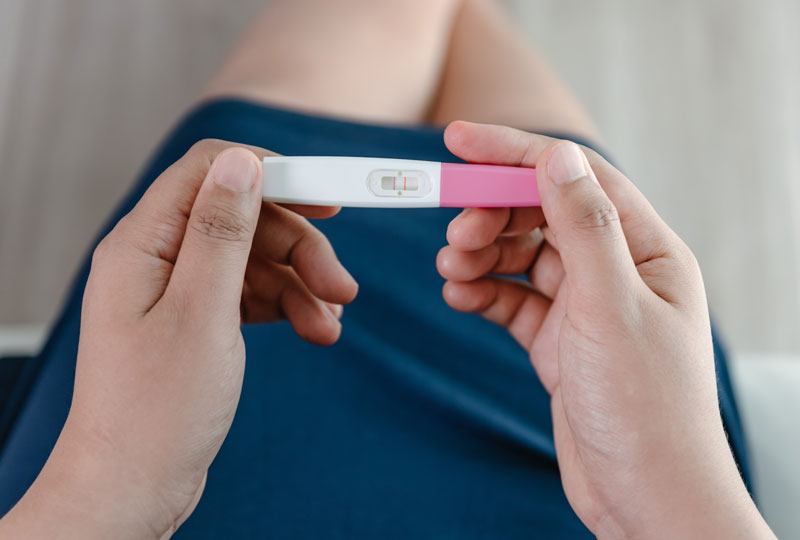The first few weeks of pregnancy can be full of unknowns. When excitement threatens to turn into anxiety, try these tips.
Early pregnancy can feel like a roller coaster ride full of both anxiety and excitement. You might be planning for the future one moment, only to find yourself worrying about it the next. Additionally, there is the all-too-real fear of miscarriage to contend with.
“As a midwife, I have often said the wait from the two lines on the stick to feeling the first kicks can seem so agonizingly long,” said Bethany Sanders, a certified nurse midwife with Vanderbilt Women’s Health. “Here are some tried-and-true practices for reducing pregnancy anxiety during the first few weeks that I use with my clients — and my own pregnancies.”
Connect with your body.
There are so many incredible things happening so quickly that it can be easy to let these changes increase pregnancy anxiety. Instead of focusing on what might feel different or strange, sometimes it’s helpful to step back and try to adopt an attitude of curiosity, wonder or appreciation for everything your body is going through.
“Any pregnancy symptoms you may be experiencing are a reflection of the amazing process taking place in your body,” Sanders said. “Some women may choose to connect with their bodies through yoga, prayer, meditation or exercise.”
Optimize your health.
Start taking a daily prenatal vitamin and DHA. The folic acid in prenatal vitamins reduces the risk for certain kinds of birth defects and helps fill in the gaps in nutrition for days when morning sickness or food aversions limit what you can eat. DHA has been shown in animal studies to promote brain and eye development.
“Be sure to drink plenty of water, even though in early pregnancy, your bladder may feel like it’s the size of a thimble!” Sanders said. “Limit caffeine, which in high doses may increase the risk of miscarriage.”
If you aren’t already exercising, try introducing low-impact activities like going for a walk, bike ride or swim a few days a week. Be sure to stop smoking and drinking alcohol to prevent negative effects on baby.
Stay grounded in daily normalcy.
By the time the pregnancy test is positive, your body has already accomplished so much. Worrying once you know you are pregnant isn’t going to help anything. However, this is easier said than done! Distractions can help keep your mind off things.
“If you find yourself worrying, try to distract yourself by immersing yourself in hobbies or your daily activities,” Sanders said. “Stay away from the internet or anything that you notice makes you feel more anxious. If expressing yourself helps, talk about your fears with a close friend or write in a journal.”
Sanders said it’s important to remember that miscarriages do happen, but they are often not the result of your actions. Worrying, obsessively consuming information and policing your own behavior won’t help. Your body processes will unfold naturally without “help” from pregnancy anxiety.
“While pregnancy loss is unfortunate and does happen, it’s important to remember that in the vast majority of cases, there was nothing you could have done differently,” Sanders said. “Focus on your day-to-day life, and let your body do the rest.”
Announce the pregnancy when you are ready.
Traditionally, women have waited until the end of the first trimester to publicly announce their pregnancies, as miscarriage rates are lower after this time. Recently more women are making their pregnancies known earlier with the thought that they want support from family and friends no matter what the outcome may be.
“Whatever timing is right for you is the best timing,” Sanders said.
Make an appointment with your physician or midwife.
This can give you something to look forward to as well as give you a resource for questions or concerns that you might have during the first weeks of pregnancy. Be aware that many offices schedule the first appointment after eight weeks.
“Congratulations on your early pregnancy,” Sanders said. “It can be a wild and hormonal ride, but it’s also an opportunity to appreciate the miracle of how two single cells can grow into a complete person in only 40 weeks.”

Expert care for you and your baby
Each pregnancy and delivery is unique and yours should be too. Learn more about how Vanderbilt Health’s obstetrics and maternal fetal medicine teams bring together nationally ranked expertise and personalized care from your first prenatal visit to delivery and beyond.
To learn more, call 615-343-5700 or schedule an appointment online.




